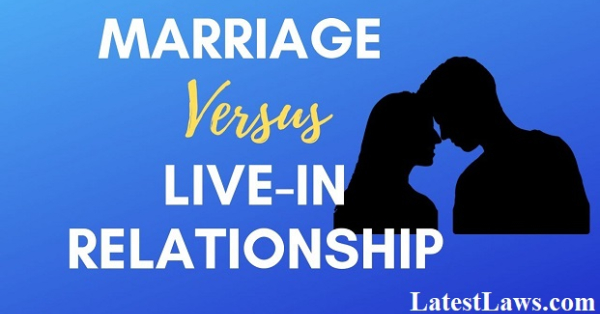Live-in relationship between consenting adults is not considered illegal under the Indian law. In 2006, in the case of “Lata Singh v. State of U.P,” it was held that a live-in relationship between two consenting adults of opposite sex, though perceived as immoral, does not amount to any offence under the law.
1 In another important case “Khushboo vs Kanaimmal and another,” the Supreme Court observed “Though the concept of live-in relationship is considered immoral by the society, but is definitely not illegal in the eyes of the law. Living together is a right to life and therefore it cannot be held illegal.”
If live-in relationships continue for a long period of time and the couple present themselves to the society as husband-wife, they get recognized as being legally married. As early as 1978, in “Badri Prasad Vs Deputy Director Consolidation,” observation was made that “
If man and woman who live as husband and wife in society are compelled to prove, after half-a-century of wedlock by eye-witness evidence that they were validly married fifty years earlier, few will succeed. A strong presumption arises in favor of wed-lock where the partners have lived together for a long spell as husband and wife. Although the presumption is rebuttable, a heavy burden lies on him who seeks to deprive the relationship of its legal origin. Law leans in favour of legitimacy and frowns upon bastardy.” Same observation was made in “SPS Balasubramanian Vs Suruttayan”, in which it was observed that where a man and a woman live together as husband and wife for long time, presumption under the law would be in favor of their being legally married to each other unless proved to the contrary and children born out of such live-in relationship would be entitled for inheritance in the property of the parents. If such relationship is only for sexual reasons, neither of the partners can claim benefits of a legal marriage. “Indra Sarma vs VKV Sarma” was another landmark case on the matter of live-in relationship in which implications of different types of relationships were examined. If both the partners are unmarried and enter into a relationship mutually, it does not constitute any offence. Prior to 2018, domestic cohabitation of a married or unmarried man with a married woman constituted a criminal offence of “adultery,” but for the man only, under Section 497 of Indian Penal Code (IPC). But this section was annulled by the Supreme Court of India in the case of “Joseph Shine vs Union of India” in September 2018, as the Court came to the conclusion that it was violative of the Article 14 of the Constitution of India. The section treated men and women unequally as only the man and not the woman is subject to prosecution for adultery. Moreover, it was only the husband of the concerned woman who could prosecute the man who was involved in the act and the woman cannot prosecute her husband for adultery. Though adultery is no longer a criminal offence, but the matter of cohabitation with any married man or woman may be a matter of civil issues constituting a ground of divorce, in which case it would be gender neutral. Similarly, cohabitation with sexual relations between two adult partners of same sex also constituted crime of unnatural offence under Section 377 of IPC prior to 2018. But the position was reversed in “Navtej Singh Johar vs Union of India”. The Supreme Court annulled the Section 377, insofar as it criminalized the homosexual sexual acts of two or more adults in private who possess competency to consent. It was termed to be unconstitutional, irrational, indefensible and arbitrary, and being violative of Articles 14, 15, 19, and 21 of the Constitution. However, the Section 377 continues to be in the statute book as legally valid and applicable insofar as the Section 377 applies to the nonconsensual sexual acts between the two adults, to the sexual acts against minors and all acts of bestiality.
7 Though consensual homosexual sexual acts were legalized, but the same sex marriages are not recognized in India, though performing a symbolic same sex marriage is not prohibited either.
To get recognized as “in the nature of marriage,” certain conditions were set by the Supreme Court in the case of “D. Velusamy and D. Patchaimal (5 SCC 600).”
- The couple must hold themselves out to society as being akin to spouses.
- They must be of legal age to marry.
- They must be otherwise qualified to enter into a legal marriage, including being unmarried.
- They must have voluntarily cohabited and held themselves out to the world as being akin to spouses for a significant period of time.
In “Indra Sarma vs VKV Sarma,” the Supreme Court was of the view that all live-in relationships are not relationships in the nature of marriage. In this particular case, it was found that the appellant, having been fully aware of the fact that the respondent was a married person, could not have entered into a live-in relationship in the nature of marriage, because it has no inherent or essential characteristic of a marriage, but a relationship other than in the nature of marriage. The Court further made following observations in this case.
- Such relationship may endure for a long time and can result in a pattern of dependency and vulnerability, and increasing number of such relationships calls for adequate and effective protection, especially to the woman and children born out of that live-in-relationship.
- Legislature, of course, cannot promote premarital sex, though, at times, such relationships are intensively personal and people may express their opinion, for and against.
- Thus, the Parliament has to ponder over these issues, bring in proper legislation, or make a proper amendment of the Act, so that women and the children born out of such kinds of relationships are protected, though such relationship might not be a relationship in the nature of a marriage.5
It is pertinent to note here that the Sections 494 and 495 of the IPC prohibits any marriage of person within the lifetime of her/his husband or wife and even makes it a punishable offence, unless it is permitted by the personal law of the concerned person. Therefore, a live-in relationship of a married man with a woman or of a married woman with a man cannot be recognized as in the “nature of marriage” as it is expressly prohibited by law. However, children born out of such relationship, though not regarded as legitimate, would have all the rights within the parameters as described below.
Subscription and open access journals from SAGE Publishing, the world's leading independent academic publisher.

journals.sagepub.com

 www.ndtv.com
www.ndtv.com





